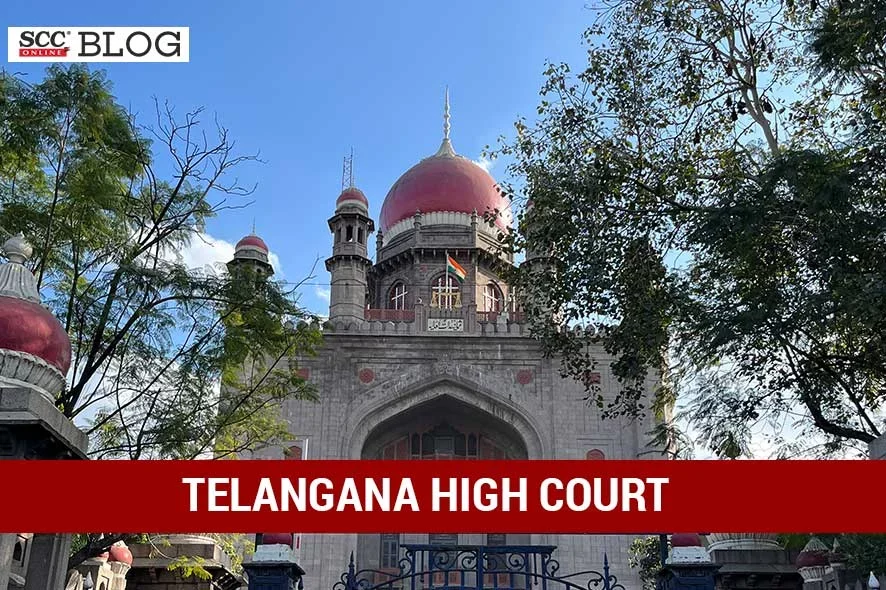Telangana High Court: In a case wherein, the petitioners had challenged the validity of Sections 5, 6 and 15 of the Press and Registration of Books Act, 1867 (‘the Act’), the Division Bench of Alok Aradhe, CJ., and N.V. Shravan Kumar, J., opined that the Sections 5 and 6 of the Act had sought to regulate the activity of newspapers publications, which was a reasonable restriction under Article 19(2) of the Constitution and therefore, the fundamental rights of the petitioners under Articles 19(1) and 21 of the Constitution had not been infringed. Thus, the Court held that Sections 5, 6 and 15 of the Act were intra vires and did not suffer from any infirmity and accordingly, dismissed the writ petition.
Background
In the instant case, the petitioners print and publish fortnightly law journal, ‘Law Animated World’, which was being published online only. On 16-08-2004, Petitioner 4, submitted an application to the Magistrate for enclosing an application in an Annexure to the Registrar of Newspapers for India for the title verification. However, even after two months, the application was not forwarded to the Registrar of Newspapers for India, on the ground that the petitioners had not paid user charges of Rs. 2,000.
Thereafter, on 16-10-2004, Petitioner 4 made a complaint to Respondent 5, stating that demand of user charges to the extent of Rs. 2000 was arbitrary and illegal.
Thus, the petitioners filed the present writ petition challenging the validity of Sections 5, 6 and 15 of the Act on the ground that they were violative of Articles 14, 19(1) and 21 of the Constitution.
The petitioners contended that Section 5 of the Act prescribed rules only for publication of newspapers and not for books, therefore it was violative of Article 14 of the Constitution. Further, procedure prescribed in Sections 5 and 6 of the Act was not reasonable, fair and just, thus, it was violative of Articles 19(1) and 21 of the Constitution.
Analysis, Law, and Decision
The Court noted that Section 1 of the Act had defined the expressions ‘book’ and ‘newspaper’ separately. Thus, the Court relied on State of U.P v. Kartar Singh, AIR 1964 SC 1135, Jaila Singh v. State of Rajasthan, (1976) 1 SCC 602 , State of Haryana v. State of Punjab, (2004) 12 SCC 673 Ram Krishna Dalmia v. S.R. Tendolkar, 1958 SCC OnLine SC 6 K.R. Lakshman v. Karnataka Electricity Board, (2001) 1 SCC 442 and opined that “the wrath of Article 14 of the Constitution of India is attracted only when equals are sought to be treated differently. In the instant case, Sections 5, 6 and 15 of the Act which have been enacted with the salutary object of regulating an activity of printing of newspapers, cannot be struck down on the ground that the same do not provide for similar requirement in respect of a book which is different from newspaper. In the instant case, the equals are not sought to be treated differently.” Therefore, the Court opined that Sections 5, 6 and 15 of the Act, could not be said to be arbitrary or discriminatory.
Further, on perusal of Section 5 of the Act, the Court opined that it mandated that no newspaper should be published except in conformity with the rules which were prescribed therein. As per Section 5(2) of the Act, printer and publisher of every such newspaper should appear in person or by an agent authorised in his behalf, before a District, Presidency or Sub-Divisional Magistrate within whose local jurisdiction such newspaper should be printed or published and submit a declaration provided in the section.
The Court noted that as per Section 5(2A) of the Act, every declaration under Section 5(2) of the Act should specify the title of the newspaper, the language in which it was to be published, periodicity of its publication and should also contain any other particulars which might be prescribed. Further, the Court observed that Section 6 of the Act provided that the two originals of every declaration made under the Section 5(2) of the Act should be authenticated by the signature and official seal of the Magistrate before whom the declaration had been made.
The Court opined that Article 19(1)(a) of the Constitution which conferred a fundamental right to freedom of speech was subjected to reasonable restrictions under Article 19(2) of the Constitution. The Parliament by enacting Sections 5 and 6 of the Act had sought to regulate the activity of newspapers publications, which was a reasonable restriction and thus, it did not amount to violation of Article 19(1)(a) of the Constitution. Therefore, the Court opined that the fundamental rights of the petitioners under Articles 19(1) and 21 of the Constitution had not been infringed.
Thus, the Court held that Sections 5, 6 and 15 of the Act were intra vires and did not suffer from any infirmity and accordingly, dismissed the writ petition.
[V. Venkataramanaiah v. Union of India, 2023 SCC OnLine TS 3333, Order dated 29-09-2023]
Advocates who appeared in this case :
For the Petitioners: I. Mallikarjuna Sharma, Advocate;
For the Respondents: K. Mani Deepika, Advocate








